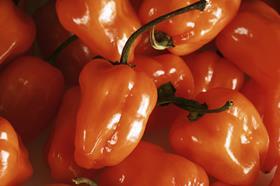
The market for Habanero hot peppers is finally recovering after recent pesticide residue issues from key supply country Uganda created a shortage and sent prices soaring.
Uganda supplies 80 per cent of the European market for Habaneros, which are widely used in Afro-Caribbean cooking, but in the last six months Defra has been repeatedly seizing consignments that do not meet import standards for hygiene and pesticide
residues.
Managing director of New Spitalfields Market exotics importer Tropifresh, Peter Durber, explains: “An awful lot of peppers grown in Uganda were not fit for export, which created a shortage so prices have been very high.
“Because Uganda has such a dominant position in this market, other countries haven’t had a chance, although with recent market difficulties the Dominican Republic and Jamaica have been stepping up. The issue has been going on for the last six months, although it peaked in the last three with Defra seizing more and more pepper consignments.”
Durber describes the demand for Habaneros as “steady”, and says that it is supply that usually has difficulties.
Mostly available 52 weeks of the year, Habanero hot peppers are occasionally affected by bad weather, especially rain, and they are imported via airfreight, which has led to huge losses for Ugandan exporters when consignments have been rejected. Durber admits his own supplier was one of those who didn’t “cut the mustard” – so he has been considering suppliers in Uganda and in other countries.
“The Habanero hot pepper market is very strong at the moment because Uganda, as the main player, has had issues with pesticide residues, and some bugs. But they are gradually getting their act together so the market is recovering,” he says.
Built “out of nothing” with assistance from aid money, according to Durber, Uganda now supplies 80 per cent of the European hot pepper market. There is no domestic market for the peppers – they are all grown for exports, with Europe as the principal market. “In my opinion it is one of the few success stories where aid money has worked,” he adds.
Elsewhere, Evesham-based exotics importer Planet Produce said it follows the seasons in importing Dutch and Spanish red and green picante chillies, with Green Jalapeño mostly shipped directly from India, and Spanish used to fill in when required.
The firm’s Paul Weetman explains: “We also have a growing market for hot chillies, including Mexican Naga and Scorpion, which we expect to start in the next few weeks. English Naga will be available this year, though we are having supply problems with Thai Birds Eye varieties, which at the moment are very hard to come by.”



